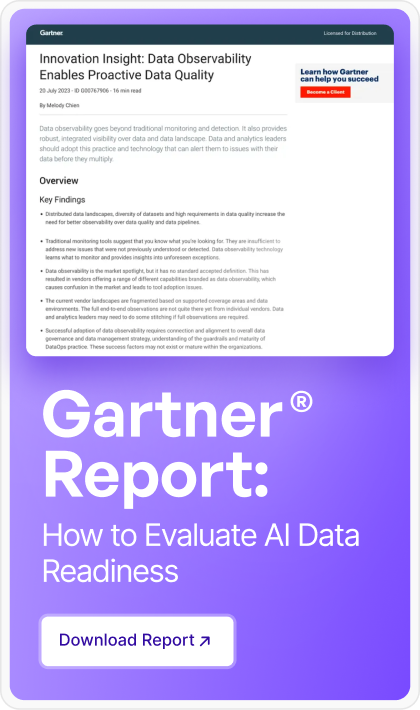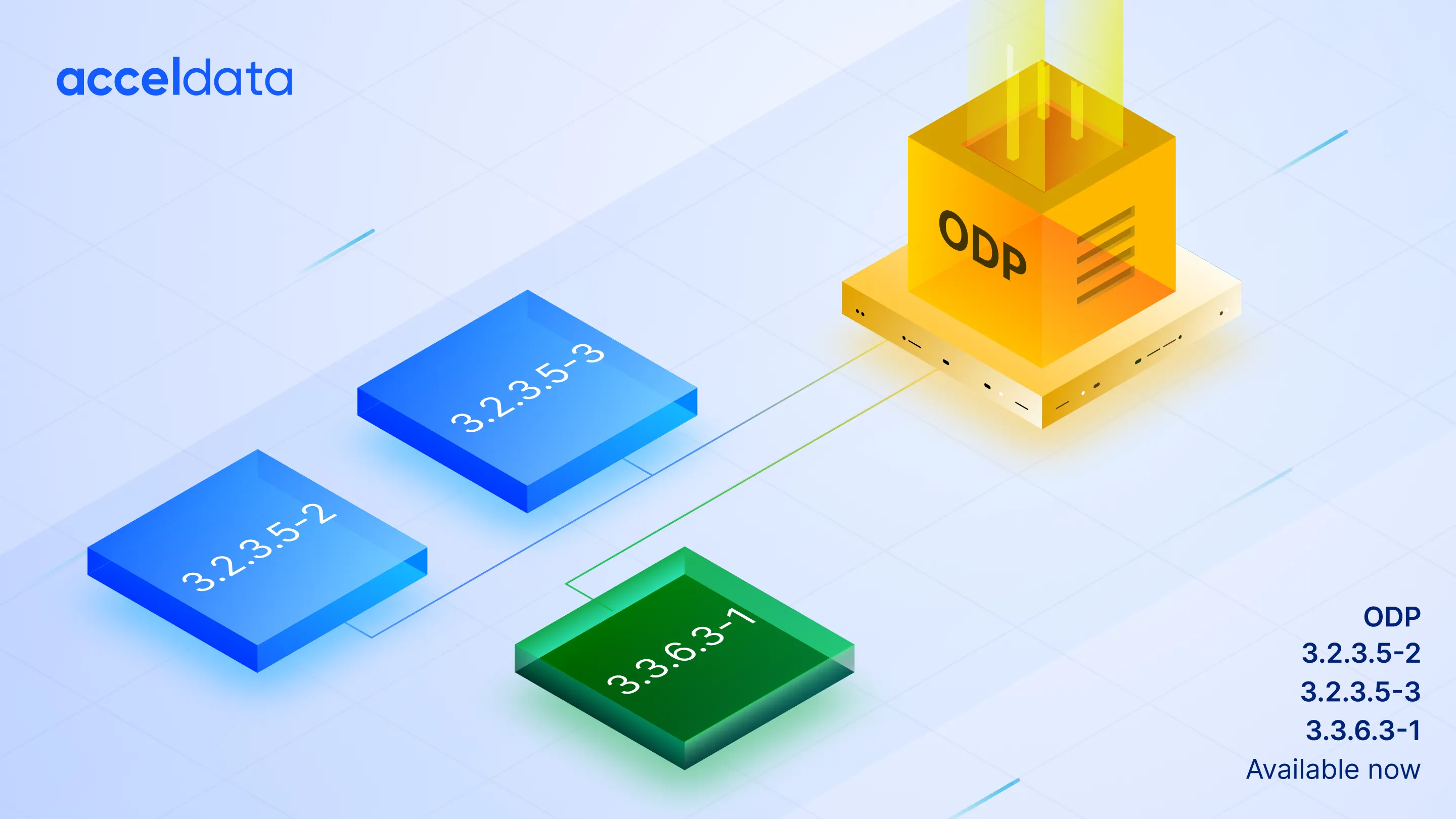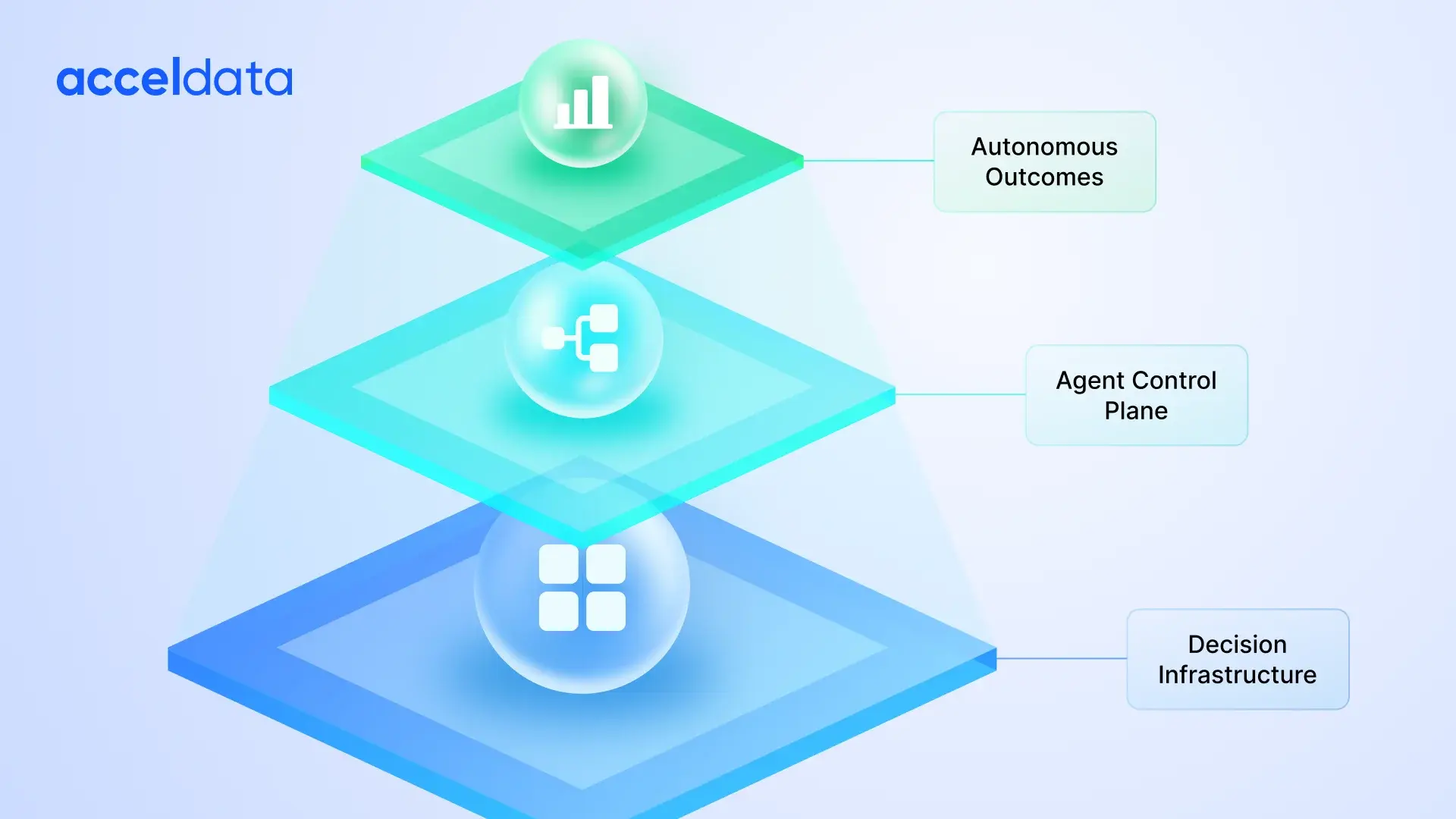Struggling to turn your data into business value? You’re not alone.
Despite investing heavily in cloud platforms, analytics tools, and AI initiatives, many enterprises still struggle to get the insights they need—when they need them. Why? Because traditional data management systems weren’t built for today’s speed, complexity, or scale.
Data often lives in silos. Governance is reactive. Quality varies. And decision-makers are left waiting—or guessing.
That’s where Agentic Data Management Platforms come in. These AI-powered systems transform how organizations manage and operationalize data—so they can make faster, more confident, and more connected decisions.
In this blog, we’ll break down what agentic data management really means, how it differs from traditional approaches, and why it’s becoming essential for AI-first enterprises.
What is an Agentic Data Management Platform?
An Agentic Data Management Platform (ADMP) is an AI-driven, context-aware system that enables intelligent agents to work with high-quality, unified data across your enterprise.
Unlike traditional data platforms that simply observe and report, agentic platforms:
- Understand the business context
- Recall past patterns and actions
- Learn continuously
- Proactively recommend or execute improvements
Think of it as the difference between a monitoring dashboard and a smart assistant who not only spots issues but suggests the best next step—or takes it.
Key Capabilities of Agentic Platforms:
- Unified Data Fabric: Real-time synchronization across domains and systems
- Contextual Intelligence: Tracks lineage, applies policies, scores quality
- Autonomous Agents: Drive governance, cost control, and optimization
- Self-Learning Feedback Loops: Improve decisions over time
These platforms don’t just manage your data—they activate it.
Examples of Agentic Data Management in Action
Understanding the value of agentic data management becomes clearer when you see what it looks like in practice. For example, consider a global retailer whose marketing and supply chain teams operate in silos. With an agentic platform, AI agents continuously reconcile data between departments, automatically flag discrepancies, and adjust forecasts in real time—enabling faster, more accurate decisions that impact revenue.
Or take a financial services firm facing regulatory pressure. Instead of relying on manual audits, an agentic platform embeds compliance rules into every data flow, ensuring consistent policy enforcement and maintaining audit trails automatically.
These are not aspirational use cases—they reflect the very real operational improvements that are already being realized. From issue detection to self-correction, agentic platforms free up teams to focus on strategy rather than troubleshooting.
How Is Agentic Data Management Different from Data Observability?
Data observability has helped many organizations detect pipeline issues earlier and understand how their data moves through systems. However, observability stops at visibility. It can alert teams to problems but typically relies on manual intervention to resolve them. For fast-moving businesses, that’s no longer enough.
Agentic data management takes observability further by embedding intelligence into the data ecosystem itself. It doesn't just surface anomalies—it understands them in context, recalls past patterns, learns over time, and either suggests or initiates action. This is especially important as enterprises scale AI and automate decision-making processes. Rather than reacting to problems after the fact, agentic platforms anticipate them and resolve them dynamically, minimizing business impact and increasing operational resilience.
Why Traditional Data Systems Fall Short in the Age of AI
Here’s where most enterprises hit a wall:
1. Siloed Architecture
Different teams use different tools and definitions, leading to fragmented insights.
2. Slow Governance
Manual reviews, batch updates, and inconsistent enforcement delay progress.
3. Lack of Context
Most platforms can’t answer: “Where did this data come from?” or “Can I trust this?”
4. Missed Moments
In today’s real-time world, delayed decisions often mean missed opportunities.
What Problems Does Agentic Data Management Solve?
Many enterprises today find themselves investing heavily in cloud platforms, analytics tools, and AI capabilities, yet still struggling with operational inefficiencies, decision delays, and lack of data trust. The core issue often lies in how data is managed—or rather, how it isn’t. Traditional data systems were not designed to handle today’s fragmented environments, hybrid architectures, and the pace at which businesses now operate.
Agentic data management directly addresses common enterprise frustrations: data silos that prevent end-to-end visibility, inconsistent data definitions across teams, governance policies that are enforced too late to make a difference, and the mounting costs of manual data operations. By enabling intelligent agents to unify, govern, and act on data in real time, organizations can shift from reactive problem-solving to proactive decision-making—making data a competitive asset rather than a liability.
How Agentic Data Platforms Solve These Problems
Agentic systems are built to address these exact challenges by:
- Integrating structured and unstructured data into a shared, consistent fabric
- Embedding governance into workflows—not after the fact
- Providing context-aware agents that learn and adapt over time
- Enabling AI systems to act on reliable, real-time data
This makes agentic platforms uniquely suited for organizations aiming to scale AI safely and responsibly.
Core Features That Set Agentic Data Management Apart
Agentic data management platforms offer capabilities beyond traditional systems to support intelligent, autonomous data operations. They help enterprises streamline complexity, data integrity, and enable real-time decision-making.
Unified data fabric with real-time sync
- Integrates all data types across the enterprise.
- Maintains consistency between operational and analytical systems.
- Delivers real-time synchronization instead of batch updates.
- Resolves semantic differences between business domains.
Unified data strategies like data fabrics help organizations accelerate data discovery and improve decision-making across business functions by breaking down silos and enabling connected intelligence.
AI-ready contextual intelligence
- Embeds metadata about data lineage tools and transformations.
- Provides quality metrics and confidence scores.
- Incorporates business policy logic into data flows.
- Maps relationships between entities across domains.
Autonomous multi-agent orchestration
- Deploys specialized agents for data governance, quality, and cost management.
- Enables collaboration across hybrid environments.
- Learns from agent interactions and human expertise.
- Optimizes operations based on business priorities.
Continuous observability and self-learning
- Monitors for anomalies and patterns in real time.
- Adapts thresholds based on observed behaviors.
- Learns from past interventions to improve responses.
- Proactively suggests improvements before issues impact operations.
Agentic Data Management vs. Traditional Approaches: A Comparison
Understanding how agentic data management differs from existing approaches helps clarify its unique value proposition for enterprises seeking to build AI-ready data foundations.
This fundamental shift in capabilities enables organizations to move from managing data as a passive asset to leveraging it as an active, intelligent resource that continuously adapts to business needs and delivers measurable outcomes across the enterprise.
Why Businesses Need an Agentic Data Platform Now
The convergence of AI adoption, rising data costs, and the emergence of multi-agent architectures has urgently needed more sophisticated data management strategies. Organizations face three critical challenges that agentic platforms are uniquely positioned to address:
- AI adoption is growing—but infrastructure isn’t ready
Organizations are rapidly expanding their AI capabilities. According to Gartner, 75% of enterprises will move from piloting to operationalizing AI by 2026, placing greater pressure on real-time data infrastructure and governance. Yet many still struggle to scale these efforts due to foundational data quality, availability, and trust gaps.
- Downtime and bad data decisions lead to real costs
The financial impact of poor data management is growing. Companies that invest in intelligent, context-aware agentic data platforms report fewer unplanned outages, faster resolution of issues, and greater confidence in the decisions their systems support.
- AI agents require consistent, trusted data to collaborate effectively
As businesses deploy multiple AI agents across operations, these systems must rely on consistent, high-integrity data. Conflicting or incomplete data inputs can lead to uncoordinated actions and unreliable outcomes. Unified data platform is essential to maintaining trust and performance in agent-driven ecosystems.
How Agentic Platforms Help You Prepare for AI at Scale
As enterprises move from AI experimentation to implementation, the need for scalable, trustworthy, and high-quality data infrastructure becomes critical. AI models cannot function effectively on inconsistent, poorly governed, or fragmented data. Yet many organizations discover—often too late—that their current data systems weren’t built to support scaled AI use.
Agentic platforms close this gap. They enable real-time synchronization across domains, standardize metadata and quality metrics, and provide AI agents with the context required for consistent performance. This ensures that when AI is deployed, it’s acting on data that is accurate, relevant, and governed from the ground up.
Moreover, as the number of AI agents within the organization grows, agentic platforms help orchestrate them collaboratively, avoiding conflicts, duplication of effort, or unintended outcomes. In short, these platforms make AI operations scalable and sustainable—while reducing risk and increasing confidence.
Is Agentic Data Management Right for My Company?
Every enterprise has different data needs, technical maturity levels, and business priorities. While agentic data management represents a forward-looking shift, it’s not about adopting a one-size-fits-all solution. It’s about identifying whether your current challenges justify the need for smarter, more autonomous data operations.
If your teams are consistently dealing with broken data pipelines, recurring data quality issues, governance lapses, or delays in making critical decisions, it’s likely that traditional approaches have reached their limit. Agentic data management is especially relevant for organizations adopting or scaling AI, working across complex hybrid or multi-cloud environments, or aiming to improve cross-functional alignment through unified, trustworthy data. It’s a solution built not for the future—but for forward-thinking businesses ready to solve today’s problems at scale.
What to Look for in Agentic Data Management Solution
When evaluating agentic data management platforms, consider these key capabilities and implementation factors:
Key evaluation criteria
- Unified schema management: Ensure consistent data models across functions with seamless evolution, semantic resolution, and reference integrity for coherent AI operations.
- Embedded governance and compliance: Look for built-in policy enforcement, bias detection, comprehensive audit trails, and balanced role-based access controls.
- Real-time processing: Verify low-latency synchronization with streaming and batch processing support that scales with data growth.
- AI transparency: Choose platforms offering clear visibility into AI decisions with anomaly detection and performance tracking for accountability.
Implementation considerations
- Organizational readiness: Confirm executive alignment, cultural acceptance of AI guidance, technical expertise, and process adaptability.
- Context foundation: Build quality baselines, capture domain expertise, and document patterns for business-aligned AI decisions.
- Integration management: Assess API connectivity across systems with attention to security alignment and semantic resolution.
What Questions Should You Ask Before Choosing an Agentic Data Platform?
Choosing the right platform is not just a technical decision—it’s a strategic one. To make the right choice, leaders need to go beyond feature checklists and evaluate alignment with their broader business goals and operational realities.
Key questions to consider include:
- Does the platform support autonomous agents that can act across data quality, governance, and cost management?
- Can it unify structured and unstructured data in real time across all environments—cloud, on-premises, and hybrid?
- How is governance embedded, and does it align with your compliance and security requirements?
- Does the platform provide visibility into AI decisions, including traceability and performance monitoring?
- Can it adapt to changing business logic, evolving datasets, and new regulatory demands?
- How easily can it integrate with your existing infrastructure and tools?
These questions are designed to help you assess not only product capabilities, but also long-term fit, adaptability, and value creation potential. A well-aligned agentic platform should not only solve today's issues—it should support your vision for tomorrow.
The Acceldata Advantage in Agentic Data Management
Acceldata's agentic data management platform combines data observability, governance, and automation into a unified, enterprise-grade solution for modern AI-driven environments. It enables data teams to go beyond monitoring by operationalizing data with intelligent agents that learn from historical patterns, optimize performance, and provide real-time context.
Building on its proven strengths in data observability, the platform extends into full agentic capabilities by offering:
- A unified view across hybrid data environments spanning cloud, on-premises, and virtual data centers.
- Context-aware intelligence that explains business impact and helps prioritize actions based on strategic goals.
- AI-powered memory and reasoning that recalls past decisions and continuously improves over time.
- Specialized AI agents that coordinate to address data quality, governance, data pipeline reliability, and cost optimization
To ensure successful implementation, Acceldata addresses key adoption challenges with:
- A phased deployment approach that aligns with organizational readiness and maturity.
- Extensive connectivity options that integrate with existing data infrastructure.
- Rapid context-building tools to establish the foundation for intelligent operations.
- Collaborative human-AI workflows that build trust while incrementally increasing automation.
Transform Your Data Future with Acceldata's Agentic Management Platform
The shift to agentic data management represents a fundamental change in how organizations approach their data assets. By moving from reactive observation to proactive, context-aware management, businesses can unlock the full potential of their data while reducing costs and risks.
Organizations implementing agentic data management can expect:
- Accelerated AI transformation through trustworthy, contextual data.
- Enhanced cross-functional alignment as systems share consistent information.
- Reduced operational risk through proactive issue identification.
- Improved decision-making speed and confidence.
Transform your data strategy today with Acceldata. Its experts will assess your current environment, identify high-impact opportunities, and create a tailored roadmap that can potentially deliver a tangible business value.
Schedule your personalized demo and discover how leading enterprises are already leveraging agentic data management to gain a competitive advantage.
Frequently Asked Questions (FAQs)
1. Why isn’t my current data platform keeping up with our AI and analytics needs?
Most traditional platforms were built for reporting—not for fast, intelligent decisions. They struggle with inconsistent data, manual governance, and slow response times, which makes it hard to scale AI or trust insights.
2. What is agentic data management, and how is it different from data observability?
While data observability tells you when something breaks, agentic data management prevents issues before they happen. It uses AI agents to monitor, reason, and act on data problems in real time—without waiting on manual intervention.
3. How can I stop wasting time fixing the same data issues over and over again?
Agentic platforms learn from past problems, recognize recurring patterns, and proactively prevent them—so your team spends less time reacting and more time delivering value.
4. Our data lives in too many places. Can an agentic platform handle this?
Yes. A key benefit is unifying data across cloud, on-prem, and hybrid environments in real time—so all your systems work with the same trusted information.
5. How can I trust AI to manage sensitive data or take automated actions?
Good agentic platforms like Acceldata are built with explainability, permissions, and audit trails. You stay in control with full visibility into what actions were taken, why, and by which AI agent.
6. We want to scale our AI use—but how do we avoid data quality issues slowing us down?
Agentic data platforms provide the real-time context, quality checks, and governance AI needs to work reliably—reducing risks and improving trust across teams and systems.
7. What’s the business value of switching to an agentic data platform?
You get fewer outages, faster fixes, more reliable data, and better decisions. That translates into lower costs, fewer mistakes, and faster growth—especially as AI becomes a core part of your operations.
8. Is agentic data management only for big tech or advanced AI teams?
Not at all. Any business dealing with complex data and rising demands for speed and accuracy can benefit—whether you're a bank, retailer, manufacturer, or healthcare provider.
9. How does Acceldata’s agentic platform help businesses?
Acceldata helps unify your data, continuously monitor it with AI agents, and act on issues before they impact business. It's designed to scale with your needs—while reducing manual effort, costs, and risks.
10. What’s the first step to get started with agentic data management?
Start small with a high-impact area—like a key pipeline or data quality pain point. Acceldata offers a phased, guided approach to help you build trust, show value fast, and scale as you grow.








.png)








.webp)
.webp)


